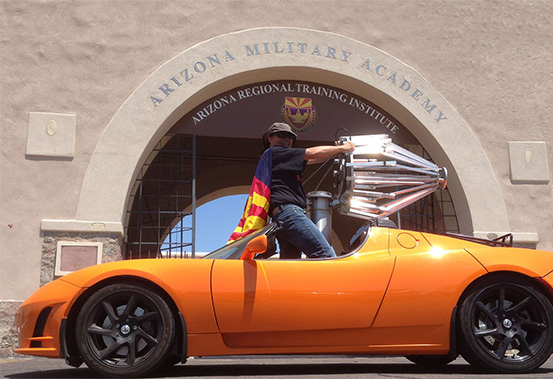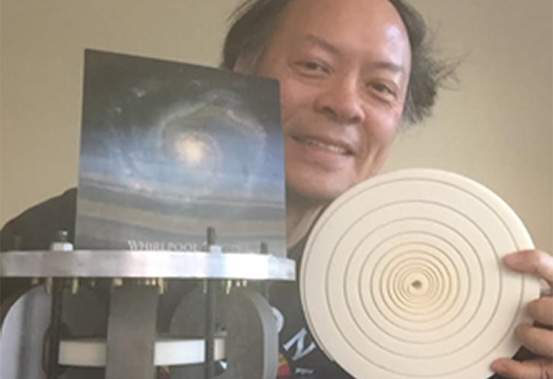Joseph Y. Hui is Professor Emeritus at Arizona State University, CEO of Monarch Power Corp, and also goes under the name of Solar Man. Since 2010, he has filed more than ten patents in the areas of water, energy, food, information, and transportation, collectively known as We-fit. Professor Hui delivered Hong Kong as a Smart City, a distinguished lecture for the Institute for Advanced Study at City University of Hong Kong in July 2016.
Imagine! We can all have the energy we need, where we need it, now. We no longer depend on power stations or the grid. Forty years after E.F. Schumacher1 championed the concept of small-scale intermediate technology, small is not only beautiful, it is sexy too!
I am proposing a paradigm shift to personal energy. The goal is to reverse the Thomas Edison centralised model of power generation and distribution. In the future, energy will be locally collected, stored, converted and used.
We cannot keep on trashing the earth. Energy sources should be primarily renewable, with fossil fuel as a backup energy supply. So, let's aim big but think small.
" If you're someone with some crazy-sounding ideas to solve our energy challenge, the world needs you "
The Bill Gates challenge
In his annual letter for 2016, Bill Gates said that he was looking for a miracle to solve the world's energy and environmental problems:
“When I say 'miracle', I don't mean something that's impossible. I've seen miracles happen before. The personal computer. The internet. The polio vaccine. None of them happened by chance. They are the result of research and development and the human capacity to innovate.”
“In this case, however, time is not on our side. Every day we are releasing more and more CO2 into our atmosphere and making our climate change problem even worse. We need a massive amount of research into thousands of new ideas – even ones that might sound a little crazy – if we want to get to zero emissions by the end of this century.”
Personal Energy
I have been working on flow battery, solar fuel, and solar thermal for the past five years. The key to solar thermal is the invention of a hybrid solar and gas turbine that has 10 S qualities – smart, small, simple, scalable, save money, strong, silent, safe, storage, and stylish. The turbine will be key to bringing in a new industry of Personal Energy and Smart Environment.
Personal Energy replaces the late 19th century model of centralised generation with a new model of distributed generation. It personalises generation, storage, conversion, and use of energy at a lower cost, higher functionality, and it is totally mobile. It uses heat energy for co-generation of electricity, heat, and chilling. Personal Energy also allows desalination of water, production of food, and electric transportation.
The new technology will bring low cost We-fit to people wherever they are, in Africa, India, or China.
The fourth industrial revolution
In the first industrial revolution James Watt's steam engine led to tremendous improvements in productivity. In the second, following groundbreaking work by Edison and Tesla, electricity was distributed by the grid. In the third, Moore's law, predicting that electronics would improve by a factor of 2 every 18 months, came true – ushering in the information age. And now we are seeing the fourth industrial revolution in personal energy bringing things full circle.
How? By thinking small. Electricity works better on a small scale – allowing an explosion of productivity. In the future, industrial-scale mechanical machinery can be reduced to a personal scale, and can become independent of the grid. Big power will be possible on a human scale. Five crucial areas go personal: There are plans for water, energy, food, information, and transportation, summarised as We-fit in my recent book What's the Matter with Energy.2
" My passion is to help people all over the world to live a comfortable and sustainable lifestyle "
Hybrid solar and gas turbine
A core innovation is the hybrid solar and gas turbine. I asked myself how does a turbine turn in the most natural way? I looked to the most powerful and devastating phenomenon in nature for inspiration – the hurricane, and the spiral that it creates.
The new generation turbine is mathematically very similar to the hurricane's spiral. Gas pushes from the inside to the outside, exponentially increasing its radius in the process. In the conventional turbine, the blades are obstructions. Hot, high pressure gas is produced by the compressor to make the blades turn. But this impact causes heat – and loss of efficiency. By numerically solving the gas flow and the power of the turbine, four key parts – turbine, compressor, generator and the motor – have been successfully miniaturised. The result? A system that produces more than 50% efficiency. This compares to 40 - 50% for very large gas turbines, and less than 20% for solar panels.
The turbine can satisfy the needs of disparate cultures. In the American car-based culture that means a hybrid car is key. An electric motor and generator on board the car can be at the centre of power generation for the house, supplying both heat and AC energy. Solutions are scalable for all kinds of situations. The Firefly Trigen turbine series coming in five sizes: 100W for personal use, 1kW for small offices or rooms, 10kW for families, 100kW for small enterprises, and 1MW for large enterprises and communities.
Emergency backup
The East Coast of the US is prone to natural disasters, and they can bring the grid down. But co-generation, using turbine technology with heat and chill generation is the answer for emergency backup. At present a lot of natural gas is wasted through burning. It is a crime not to use natural gas to make electricity. Gas is abundant, safe and reliable – and pipelines do not go down in natural disasters such as hurricanes.
Smart energy is about personal energy, distributed energy, and user driven apps. It is user-friendly, mobile, and ubiquitous. This approach is integral to emergency response, hospital, transportation, communication, and environmental control.
The long-term ambition in the United States is even grander. Starting with solar-rich states such as Arizona, I aim to enter the market with cheap locally produced energy, and turn things on their head. In the future, smart energy is the default. The power company only comes into play with the backup power generator!
Energy justice
The new technology can also spearhead a move to global climate and energy justice. Why should European, American and Chinese companies have a monopoly on fossil fuel in Africa? I believe it is impracticable to bring a fossil fuel powered grid to Africa. Not only is it inefficient, it is also prone to energy loss by people stealing energy in areas where the state is weak. For example, there is little power in Northeast Nigeria where Boco Haram is operating. Again, the future is bringing the technology to the point of personal use. My motto goes: “Create solar energy of the people, for the people, and by the people.”
Where once upon a time Church missionaries were active, 21st century Justice Ambassadors can rove the world – young people acting as emissaries for social and climate justice worldwide. It is social justice, because you need to empower people where they are – giving them the electrical power they need where they live. Hence another motto – “Let's live a comfortable and sustainable life.”
The Hui spiral and turbine generator inspired by the Whirlpool Galaxy
Social entrepreneurs
I see great hope in the coming generation, many of whom are motivated by a future beyond politics and money. I don't know what they're putting in their tea, but young people are thinking altruistically!
I would like to help empower the next generation to think bigger, arranging missionary trips so that people in Africa can acquire revolutionary technology in water and energy.
In Hong Kong, it would be possible to work with the College of Business and leverage this trend to do social entrepreneurship. The idea would be to work with influential people in Africa, for example Nigeria and Tanzania. Students would go into a community, understand their needs, and help them set up the infrastructure with a local power company for community solar and gas power. They will take a holistic view of energy needs in water, environmental control, food, information, and transportation.
The notion that you are in business to help other people – and not just because you want to make a ton of money – is a noble ideal. At the end of the day there is no regulation against doing good.


